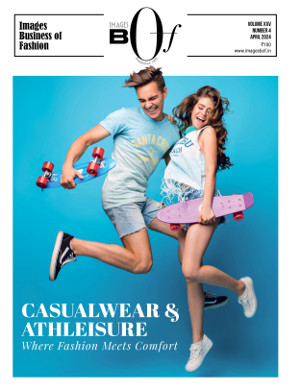The fashion industry is the second largest polluter, and the calls for the industry to do more to mitigate its adverse impacts have always been louder. Remake’s 2022 Fashion Accountability Report finds a few promising trends, but maintains that much more should be done to bring sustainability and social justice to manufacturing hubs such as Bangladesh, Cambodia, Sri Lanka and Pakistan, among other places. The report states that sustainability is being driven by a handful of companies, underscoring the need for policy and binding agreements.
For the report, Remake reviewed 58 large companies, including Chanel, Inditex, Levi’s and Allbirds, on their progress towards social and environmental goals across six categories: traceability, wages and wellbeing, commercial practices, raw materials, environmental justice, and governance. However, the advocacy group decided not to score small sustainable brands earning less than $100 million in annual revenue and self-described as sustainable or ethical, as, it claims, that since the organization’s measurements are designed to hold large corporations accountable.
Traceability
The report maintains that at present traceability in fashion continues to be led by a handful of companies, while the majority of the industry knows little, or reveals little, about where it manufactures its goods. It observes that tracing this far into the supply chain is more challenging, but several companies are accomplishing it. Reformation, for example, published 85% of its tier 3 facilities, while Columbia Sportswear published approximately 80% of its tier 3 processing facilities by business volume, and Victoria’s Secret & Co. ‘has begun the work’ of tracing its spinning mills and other tier 3 processing facilities. However, ASOS and PUMA published supplier lists that fully disclose suppliers all the way down to tier 3, to a detail sufficient to meet The Transparency Pledge, becoming the two companies with the greatest level of traceability.
Wages & Wellbeing
The report indicates that no companies it reviewed paid all of their indirect employee living wages, including garment and supply chain workers, warehouse workers, models and drivers. Four companies published some progress towards a living wage in their supply chains in addition to disclosing the methodology they use to quantify a living wage: Patagonia, Ralph Lauren, Reformation and Hanesbrands Inc. Five companies -Burberry, Reformation, PUMA, Marks & Spencer and Kering- published partial information, indicating that some of their direct employees, such as corporate employees or retail workers, earned a living wage. Six companies revealed rates of unionization and/or collective bargaining agreements in their tier 1 cut-and-sew factories: Burberry, Everlane, H&M Group, Inditex, PUMA and Reformation.
The report highlights research presented by the Clean Clothes Campaign’s Fashion Checker that shows that only 7% of the world’s garment workers earn a living wage. According to the Asia Floor Wage Alliance (AFWA), garment workers in many Asian nations, such as Bangladesh, India and Cambodia, earn less than a third of what is necessary to meet basic needs and care for their families. It concludes that there is no indication that this reality changed in the past year, and goes on to indict that fashion is an industry built upon poverty pay, and while worker pay has gone up in some nations, it rarely keeps pace with the cost of living and inflation.
To demonstrate progress, companies, it asserts, must show wages increasing year-over- year to all of these ends. In 2022, four companies published some progress towards a living wage in their supply chains, in addition to disclosing the methodology they use to quantify a living wage: Patagonia, Ralph Lauren, Reformation and Hanesbrands Inc. Of the 58 companies, only one -Patagonia -demonstrated significant progress towards living wages paid to workers in its supply chain. There are three other companies that claimed progress towards living wages, but needed to be more transparent and detailed about this work: Hanesbrands Inc., PUMA and Ralph Lauren. Hanesbrands Inc. claimed to pay ‘all its workers a living wage’, but it is unclear if this applied to workers in third party factories.
Numerous civil society groups, such as Fashion Revolution and Clean Clothes Campaign, have banded together to ask for the European Commission to consider requiring companies to conduct due diligence on living wages. Their campaign- Good Clothes, Fair Pay- is on its way to collecting one million signatures. As a result, some companies are increasing sourcing from unionized facilities to address wages and wellbeing. Unionized workforces are keys to increasing wages and bettering working conditions across all industries, and fashion is no exception, the report observes.
Commercial Practices
26 companies or 45% of the companies it evaluated acted responsibly towards suppliers and paid for orders during the early phase of the pandemic or other unforeseen disruptions, but no large company has integrated a responsible exit policy into its contracts since then. It remarks that no company demonstrated its purchasing practices ensure its suppliers’ ability to guarantee and support fair wages and social and environmental sustainability. Four companies said they include responsible timeline considerations in their order planning to protect human rights and worker wellbeing: Hanesbrands Inc., MUJI, Patagonia and Ralph Lauren.
Mention may be made that at the onset of Covid-19, dozens of major clothing companies canceled, in total, $40 billion in clothing orders already in production, unleashing a wave of layoffs without pay and a corresponding crisis of hunger and desperation. The order cancellations sparked the landmark #PayUp campaign, which secured back $22 billion to factories and workers–but it also put the need for fair and legally binding commercial practices in the limelight.
Commercial practices are crucial as they dictate workers rights. Responsible commercial practices come down to the prices that companies pay their suppliers, the deadlines they impose on factories, the consistency of the orders they place, and the way they disengage with their factories. In addition to directly affecting how much workers earn, commercial practices influence everything from the way that workers physically experience their jobs –in terms of rates of injuries and exhaustion– to the amount of time they get to spend with their families and friends outside of work. Remake asserts that no company can demonstrate that its purchasing practices ensure suppliers’ abilities to guarantee and support fair wages or social and environmental sustainability, and calls for stronger contracts to enforce fair commercial practices.
Raw Materials
29 companies or 50% of the companies it assessed maintained a policy against the use of furs and exotic skins, but only five companies demonstrated year-on-year progress towards traceable and certified fibers sourced from animals. Three companies demonstrated and reported that their usage of virgin plastics is decreasing (and not simply that their use of recycled content is increasing): Everlane, Nike, Inc. and Patagonia. The finding says that no company sourced recycled polyester transparently while also phasing out all materials that lack a textile-to-textile solution. Also, no company adequately demonstrated that it is actively protecting the labor/human rights and the wellbeing of raw material producers.
The organization explains, materials are evaluated in three separate tranches: biogenic materials (fibers like cotton, silk, linen, rayon, and wool, which come from life forms), non-biogenic materials (synthetic materials such as those derived from crude oil) and recycled synthetic materials. We also look at the animal welfare and human rights of companies’ raw material suppliers, it adds.
Environmental Justice
34 companies have disclosed their total annual carbon emissions across their entire value chain. Three companies- Burberry, Everlane and H&M Group- met all four of Remake’s climate demands. They publish their full emissions; they have set (and had approved) short-term 1.5 pathway-aligned science based targets; they have set (and had approved) ambitious long-term net-zero targets; and they have demonstrated that they are reducing their total greenhouse gas emissions compared to their base years.
21 companies have not committed to set science-based emissions reduction targets. 11 companies demonstrated that they are investing in suppliers and offering financial incentives for factories to decarbonize. These companies are: American Eagle Outfitters, Columbia Sportswear, Gap Inc., Kering, Levi Strauss & Co., Lululemon, PUMA, PVH, Ralph Lauren, Reformation and Target.
Chemicals And Water
28 companies have adopted a Manufacturing Restricted Substances List (MRSL) and wastewater guidelines that are equivalent to or more stringent than those compiled by Zero Discharge of Hazardous Chemicals (ZDHC). Four companies — Burberry, Fast Retailing (UNIQLO, Theory, Helmut Lang, J Brand), H&M Group (H&M, COS, ARKET, and Other Stories) and Ralph Lauren — demonstrated that they are on track to meet their targets to eliminate hazardous chemicals in their supply chain.
Circularity and Product Life Extension
14 companies participated in resale initiatives to sell the companies’ own preowned products. 14 companies provided either upcycling or repair services, helping consumers extend the life of their clothes. Levi Strauss & Co., Kering and Patagonia scored the most points in this section. 18 companies made progress towards timebound targets to reduce the amount of packaging sent to landfills and source packaging raw materials sustainably/ responsibly. It underscores that no company was sufficiently transparent about what happens to clothing collected in its take back programs, such as what percentage is exported to the Global South.
Governance
Remake says that the fashion industry is hooked on overproduction. Large companies remain focused on increasing annual product output and on driving sales and profits. While many companies espouse sustainability in their marketing, and even in some aspects of their product offerings, their quarterly earnings calls are about one thing: growth.




